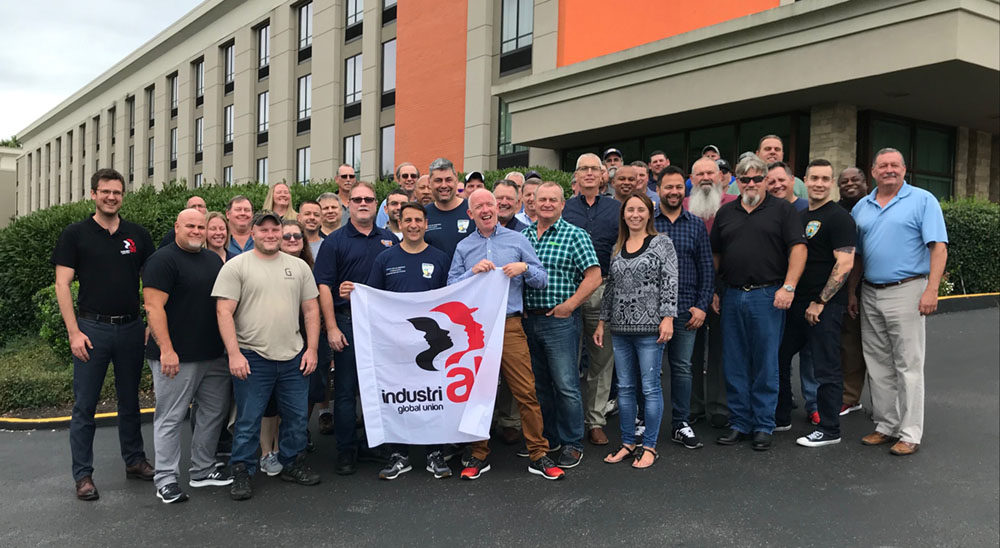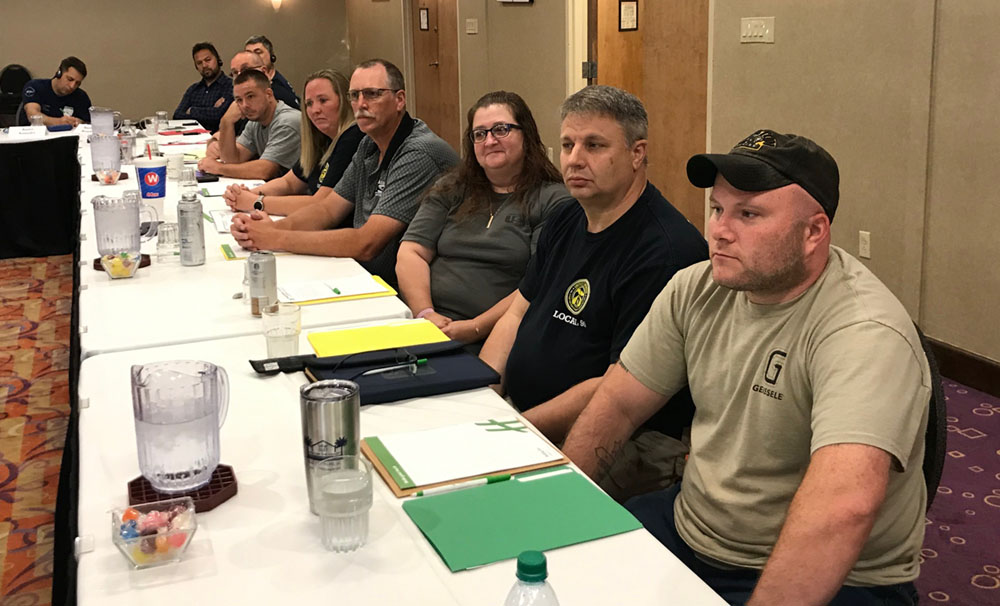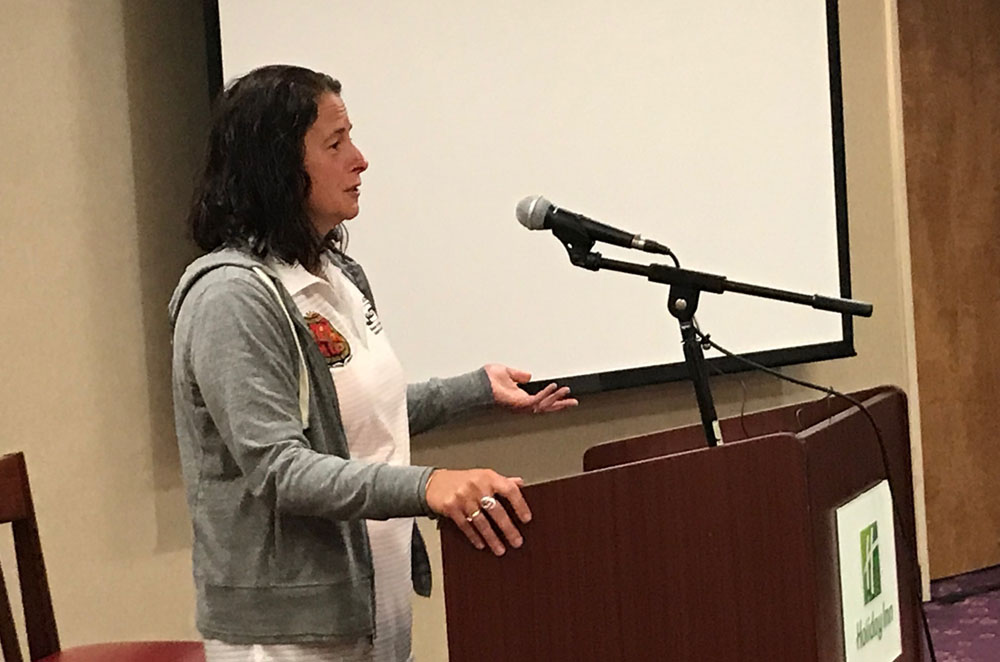DowDuPont split itself into three parts—Dow Chemical, DuPont and Corteva Agriscience—but the DowDuPont North American Labor Council (DNALC) has no plans to split into separate councils. Instead, the group will stay together to support one another, show solidarity worldwide and grow the council through organizing.
At the DNALC meeting on Sept. 23-26, hosted by USW Local 90 in Knoxville, Tenn., 49 delegates from the USW and other international unions, as well as representatives from Unite, IndustriALL and the Argentinean union, SOEPU, spoke of the council’s commitment to international solidarity, shared their experiences with the corporate breakup and discussed the council’s future.

Pictured: attendees at the DowDuPont North American Labor Council meeting in Knoxville, Tenn.
USW District 9 Director Daniel Flippo started the meeting with a call for the council to expand itself. “I want to challenge you this week to not just think about your local union, but how to extend the DowDuPont Council.
“I want to challenge you to think how you can use your strength and solidarity to adopt a Dow or DuPont plant. Adopt those members no matter how long it takes,” Flippo urged the council.
Expansion through global outreach
The DNALC started its global outreach in 2005 when the Sindicato del Personal de Industria Quimicas, Petroquimicas y Afines de Bahia Blanca (SPIQPYA) union from Argentina contacted the council for assistance. Now, international unions from the United Kingdom, Belgium, Germany, Argentina, Brazil, Japan, Germany, Indonesia, Turkey and Finland are members of the council. “We share a common interest,” said DNALC President Kent Holsing. “We assist each other globally and communicate with one another. The companies take notice of that.”
Members of the Argentinian union, SOEPU, attended the council meeting and said the DNALC has helped their union achieve a lot. The council helped the union with organizing a site in their country. Plus, “solidarity from the council created pressure on Dow that made the company negotiate,” said SOEPU General Secretary Mauricio Brizuela.
“We have to continue making our solidarity stronger because the big companies keep mutating,” he added.
Deer Park, Texas, update
Solidarity within the USW and the DNALC helped pressure Rohm and Haas Texas, a wholly-owned subsidiary of Dow, to bring back to work locked-out workers from USW Local 13-1 on June 10, 2019. The lockout lasted 50 days before Dow recanted and brought all 235 workers back into the plant.
Negotiations were difficult from the beginning, but the local, with the backing of the council, stayed strong. As the company brought in sleeping trailers and washing machine trailers in the parking lot, Local 13-1 mobilized into action the first day of bargaining on Feb. 14, 2019. The local set up a special webpage with a solidarity pledge for viewers to sign, began posting the company’s proposals and started sending out a mass text to tell members to check the webpage for bargaining updates.
The DNALC, local unions, and the global federation IndustriALL sent letters of support to the locked-out workers. Hank Niscavits, the Dow unit president for the local, stood up to major Dow investors at an investor event.
At the council meeting, Niscavits discussed the previous negotiations that set the stage for 2019 bargaining. He detailed the bargaining sessions that occurred after the talks started, what happened during the lockout, the membership rejections of the company’s “last, best & final” proposals and the negotiations that transpired after Dow let workers go back to work on June 10.

Pictured: local 90 attendees front to back: Chuck Eubanks, Eric Heidel, Missy Bridges, David Manning and Jennifer Messer.
“I am thankful for all of the help we received from the council and International. It helped us get to where we are today,” Niscavits said.
Shortly after the meeting, on Oct. 8, Local 13-1 members ratified a four-year agreement that contains annual wage increases and other improvements.
Many changes
Other locals have faced difficulties since DowDuPont split off into three companies—Dow, DuPont and Corteva—and Dow bought out its joint venture partner Corning Glass.

Pictured: local 6992 President Angelle Gregoire from the DuPont Yerkes plant in Buffalo, N.Y.
Workers in Local 12934 at Midland, Mich., who used to work for Dow Corning, got a rude awakening when they had to negotiate with Dow for a new contract last winter. Dow began its talks with the union by crossing out three-quarters of the local’s previous agreement.
The local was able to get increased pay for the shift differential, crew leader, head operator and site alternate, but the company drastically changed the job classification structure for 300 workers so it could pay them less money.
Dow’s actions increased the number of people leaving the company and reduced morale. Local 12934 had one termination a year before Dow took over. In the past nine months, the local has had 22 terminations, four deaths, 14 voluntary quits and eight retirements. When the company tried to improve morale, it installed new microwaves in the breakrooms, but had salaried personnel—not the two union painters in the plant—paint the walls and breakrooms.
Holsing, who is also president of USW Local 12075 at Dow in Midland, Mich., has seen his local membership split up into Dow, DuPont and Corteva units. Before Dow split up into three companies, his local had 710 members. Now, his Dow unit has only 65 members. The local has had to train its former members to be unit leaders at their new DuPont and Corteva units.
Holsing said the local has a grievance filed because Dow is not providing training resources so workers can progress to higher-paying jobs.
The spinoffs have created changes in human resources (HR) personnel and where they are located. If a Dow local outside of Midland has a grievance, it has to talk to an HR person in Midland.
For Local 12075-25 members at the former Dow, now Corteva, unit in Midland, Mich., the split-off impacted their pay and vacation balances. Also, the only health insurance offered is a high-deductible plan that Corteva funds at the beginning of the year with a $1,400 deposit for each employee.
Problems with payroll
Then there is the ADP e-time pay system that DuPont implemented at its sites in 2017.
“DuPont’s sites still experience many issues with members getting paid and getting pay issues rectified,” Holsing said. “It takes an hour to put in your hours worked.
“People get eight-page pay stubs with no dates listed. It’s like you need forensic accounting to understand your pay statement,” he said.
The Chambers Works plant in Deepwater, N.J., is one such case. Although DuPont split off its performance chemicals segment at the site into The Chemours Company, there still is a DuPont unit there.
Local 943-1 Unit President Bob Sheppard has been wrangling with the DuPont payroll system for several years and trying to correct paycheck problems to no avail. He has been warning the Midland site about what to expect with the problematic payroll system when Dow rolls it out there later this year. He also advised the new DuPont locals at the DNALC meeting to get in their contracts that DuPont reviews the payroll system annually.
Corteva adopted the same payroll system but it is trying to resolve the problems, Holsing said.
USW Local 12075-24 ironically titled its council presentation, “Rainbows and Unicorns” to express the members’ frustration with the new payroll system. This group used to be part of Dow and is now a DuPont company.
“No one’s paid correctly—hourly or salaried,” said Unit President Mike Bilodeau. He said injuries have also increased, and there is no longer a monthly health and safety meeting.
Unite the Union member Tony Lawrence said his plant in the UK has had the same payroll problem. “We get paid monthly and some people get paid three months later than they should.”
He said his plant used to be a Dow Corning site and is now a Dow plant. “Corning was a good employer,” Lawrence said. “Dow removed the defined benefit pension without any real consultation with the union, and cut 130 jobs.”
The council and its locals are using all avenues to resolve the problems with the paychecks: They are writing letters to corporate headquarters, filing grievances and National Labor Relations Board charges, going to their state departments of labor and contacting the media.
“People aren’t going in the plant for prestige. They’re going to earn a paycheck. This needs to be fixed,” Bilodeau said.
